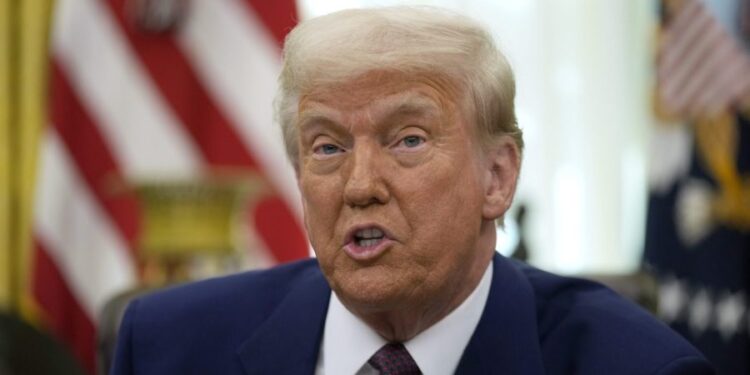
A federal judge Wednesday ordered the government to temporarily cease efforts to terminate foreign aid contracts and grants in place prior to President Trump’s inauguration amid a fight over the future of foreign aid playing out in Washington.
The order also temporarily blocks the Trump administration from issuing or enforcing terminations, suspensions or stop-work orders in connection with any federal foreign aid awards that were in existence before Trump returned to the White House.
However, the order does not bar Trump from otherwise enforcing his executive order freezing foreign assistance for 90 days pending review — narrower relief than several groups that receive funding from the U.S. Agency for International Development (USAID) requested after filing suit against the administration.
“The Court does not find it appropriate or necessary to enjoin the President or the Executive Order itself,” wrote U.S. District Judge Amir Ali in a 15-page order.
The Trump administration disclosed in court documents Wednesday evening that it had canceled more than 200 contracts issued by USAID since Tuesday morning. Those impacted include big names like Deloitte, the World Health Organization, the International Organization for Migration and several contractors who say the government owes them millions of dollars in unpaid bills.
Former USAID Administrator Andrew Natsios signaled the cuts were dramatic, telling the House Foreign Affairs Committee on Thursday that he and his team cut only 80 programs over the course of a month during former President George W. Bush’s administration.
USAID, which administers billions of dollars in foreign aid each year, has faced blistering attacks and has been systematically dismantled by Elon Musk and his Department of Government Efficiency.
The assault has rippled throughout the larger international assistance industry.
Several groups that sued the Trump administration last week alleged they were collectively waiting on hundreds of millions of dollars in outstanding invoices from the government, which has been “terminating contracts with hundreds of USAID contractors.”
Two other nonprofits filed another complaint this week alleging the executive order violated the separation of powers and has caused irreparable harm to their operations, which rely heavily on USAID funding, including layoffs, salary cuts and work stoppages.
The contractors and the nonprofits asked the judge to temporarily block the implementation of Trump’s order in full, a sweeping request that would stop in its tracks the dismantling of USAID.
“We understand that that conduct is all fruit of the poisonous tree, that it flows from the executive order and defendants’ actions to implement the order,” Nicholas Sansone, a Public Citizen lawyer representing some of the plaintiffs, said during an emergency hearing Wednesday.
Sansone called the implementation of the executive order “incredibly opaque and chaotic,” with frozen funds necessitating the shutdown of programs that could put contractors out of business.
“My clients have lost all or essentially all of their access to capital,” he said. “Their businesses are shuttering, they are terminating or furloughing their employees, food is rotting, medical supplies are expiring and community relationships that took decades to build are crumbling.”
The groups demanded the emergency hearing after receiving reports that the administration was “accelerating their terminations of contracts and suspensions of grants of USAID and State Department partners […] and may be doing so specifically in response to this lawsuit and the pending motion.”
Eric Hamilton, a lawyer for the Justice Department, argued that the contractors and nonprofits sought to use the case as a “one-size-fits-all vehicle” to litigate without nuance, noting that several of the plaintiffs have requested waivers from the State Department intended to make critical exceptions to the rule.
He also said the foreign aid in question is under Trump’s authority to dictate foreign policy.
“The President or his subordinates, and State Department or USAID, are determining that something that might have been part of a previous foreign policy of the United States is no longer,” Hamilton said.
But the contractors and nonprofits said the government has not provided meaningful guidance on the waivers and even when waivers are granted, the necessary funds have not been released and their contacts at the agency cannot provide any guidance.
Another federal judge, U.S. District Judge Carl Nichols, temporarily blocked the government from placing hundreds of USAID employees on administrative leave and recalling many from their posts around the world last Friday as part of a separate lawsuit.
That “very limited” does not touch on the effects contractors like those who sued separately might face by USAID’s dismantling.
Nichols extended the order Thursday to Feb. 21 as he weighs whether broader restrictions should be imposed while litigation is ongoing in that lawsuit.







